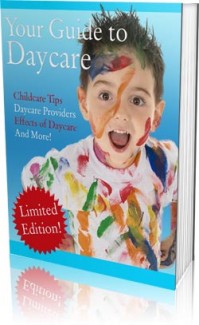 License Type: Private Label Rights
License Type: Private Label Rights  File Size: 89,529 KB
File Size: 89,529 KB File Type: ZIP
File Type: ZIP
 SKU: 52980
SKU: 52980  Shipping: Online Download
Shipping: Online Download
Ebook Sample Content Preview:
Day Care Germs an Unavoidable Pest
Germs are everywhere. And day care germs abound. They are too small to see blit we know they are there. Children can spread germs without ever getting sick themselves. They can catch colds, ear infections, diarrhea and worse. More severe illnesses like chicken pox, impetigo and hepatitis are also spread by germs. Toys are a vehicle for day care germs, so are unwashed hands of a caregiver after diaper change or blowing a child's runny nose. Runny noses don't always mean a child is sick, but the child can also be carrying something right under your nose so to speak, and you won't know it for several days until your symptoms start showing. So how can you cut back on day care germs and minimize your child's sick days Every child gets sick eventually with the average cold, but chances of spreading it to the other day care children and the sick child's family can be greatly reduced by following a few simple rules.
Always keep up to date with your child's immunizations. Schools will not enroll children in kindergarten without the immunization records filled out by the family physician. The same requirements must be met for daycare enrollment as well. Keep copies of your child's immunization records and have them ready to give to the daycare provider. You can request information on the other children enrolled in the daycare facility as well. All children enrolled in any daycare facility your child is going to should be immunized.
You should always have a backup plan for days when your child is sick and cannot attend daycare. Even if you suspect your child is catching something, he should be kept at home. The other daycare mothers will appreciate your compliance with this and they should follow suit. But there are times when some parents ignore the customary considerations surrounding children attending public environments and send their children off to daycare sick anyway.
At home, frequent hand washing can greatly reduce the chances of passing the illness on the rest of the family. As a general rule, washing your hands after coming in contact with your child is a good idea. One never knows if they are contagious with something and keeping your hands free of daycare germs, as well as any surfaces that the child may come in contact with, is good prevention. Door handles, eating utensils, toys, and plastic items such as beginner baby books should all be kept sanitized.
Toddlers should be taught right from the start to cover their mouth when they cough and proper toileting and cleanliness is a must. Stepstools in front of bathroom sinks enable children to wash their hands like big kids and colorful child-oriented soap dispensers add to the fun.
Children build immunities by being sick and then getting well. Daycare germs can speed up the process that would otherwise take place in the first years of school, even babies start building immunities by contact with other children. So a child who has never been in daycare and hasn't been sick very much will be thrown in a preschool that abounds with germs and his immunities begin to build but at the expense of lost school days. So whether parents like it or not, daycare germs do have their place in a growing child's life.
Day Care Issues Separation Anxiety
Day care issues of facility policy, additional charges and late fees, and visitation rules are important issues but none seem as pertinent as the problem of separation anxiety. Few parents enjoy leaving their child with a stranger for hours at a time, and though there are benefits to child care it is hardly on your mind when faced with a child having a temper tantrum as you are trying to leave the daycare facility to head to work. So how can you ease this often temporary7 situation The solution lies within yourself to come up with creative and personalized ways to ease your child through one of the most difficult day care issues separation anxiety.
Not all children have day care issues such as separation anxiety. Some babies and children enjoy being around other children in a new environment, and take to daycare right away. Those parents are the lucky ones. But if you are experiencing any of the following situations at drop off time, there are changes you can make to get through this time of transition (because it will pass). Don’t mistake separation anxiety for misbehaving. Understanding your child’s fears is the first step.
Your child knows you as the source of comfort in his life and even the smallest of children will experience fear when seeing their mommy leave their surroundings and go away. What you say and how you say it can be understood by your child. If you have a baby you are nursing, try to schedule time to nurse your baby right before you leave. Holding and
comforting your baby this way is a great way to make a connection, and talking to your baby helps to relax him. If you are feeling anxious about leaving your baby, he will most definitely sense this. If you have done your homework, and are confident in the environment in which you are leaving him, let this come through in your voice. Your tone of voice will reassure him yoii’ll be back soon and that you love him.
Your toddler invariably starts his tantrum early, before you even leave the house for the daycare center. Day care issues can impact the home environment as well but there are ways to get around this too. Start by being consistent. You have made up your mind to put your child in daycare, stick to the routine. Don’t look for ways to skip days; it won’t get your child through this transition period any smoother. Before bedtime, read storybooks that talk about daycare. Go to the library; the librarian can help you choose books geared to your child’s age. At the very least, talk to your child during story time; explain to him where you will be going and that you will be back for him when you are done working.








